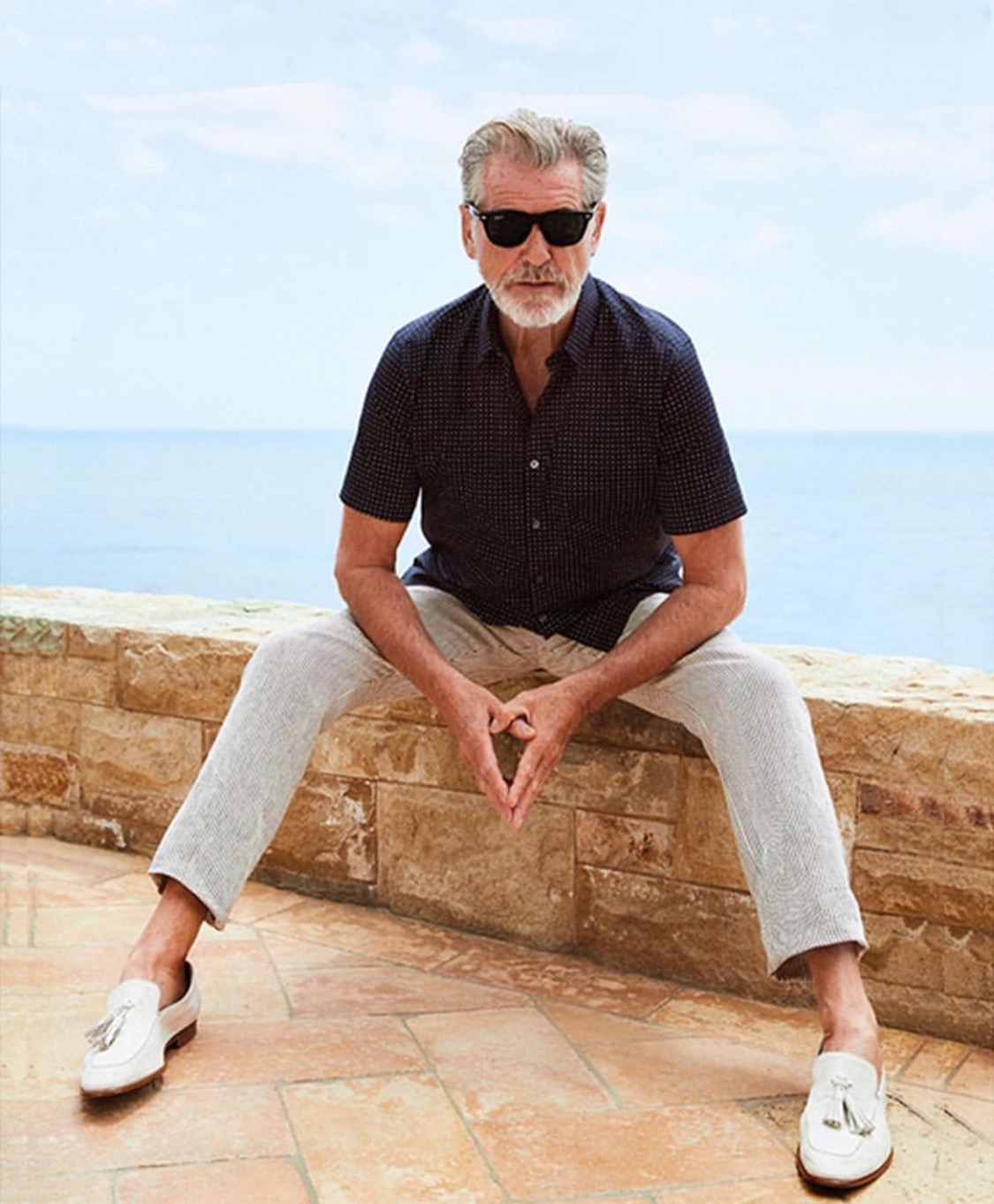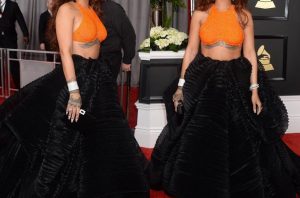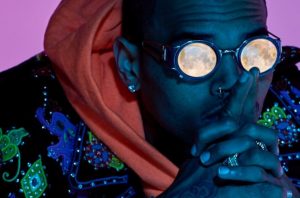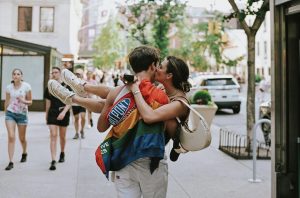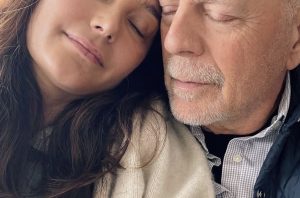Okay, so let me tell you what happens when your phone rings and the voice on the other end of the line belongs to Pierce Brosnan: You’re done. That’s it. He’s yours. I never want to hear any other voice on the phone ever again. If the phone rings again and it’s my mom on the other end of the line, I will be secretly crushed that it’s not Pierce Brosnan (sorry, mom). The voice is unmistakable: an Irish lilt softened over decades of living here in America, resulting in an accent that is entirely Brosnan’s own. Trying to replicate it would be like trying to make a Serrano ham in Jacksonville. It can’t be done. One “hello” is all he requires to reduce you to a swooning grandmother. Even the man’s scandals are debonair.
We switch to Facetime and now I can see Brosnan in full, clad in a black jacket and amber sunglasses, a polka dot scarf coiled neatly around his neck. Brosnan is calling from his rental apartment in Austin, where he’s shooting the second season of AMC’s drama The Son, based on the acclaimed Philipp Meyer novel of the same name. Brosnan plays Texas patriarch Eli McCullough, and while the accent isn’t terribly comfortable on him (do you want Pierce Brosnan to sound like anyone other than Pierce Brosnan?), the clothing is. For the part, he also grew out his beard to eminently twirlable length. A “mighty” beard, to use his word for it. He’s losing the beard tomorrow, but for now he’ll get in a few last pensive strokes.
As we talk, he moves with the phone around the apartment, which is festooned with his own linocuts and paintings. Big paintings. Brosnan got his start as a commercial artist, only to have acting get in the way and reduce his first vocation to an expansive hobby. Still, he paints. There’s a huge octatych of a woman’s face, painted in eight different stages until the final panel is just a depiction of her bare skull. There’s a huge panel painting of what appears to be a big shiny geode. Brosnan doesn’t want his painting to be typecast, and so his art is all over the place. He is all over the place, walking from room to room with a boundless energy that completely explains his lasting success. He shows me the living room. He shows me the kitchen. He takes me, virtually, out onto the balcony to get a bit of sun. He is a very clean talker, nary a contraction in sight. And he’s not afraid to let moments pass as he chooses his words (he is talking to a reporter, after all), leaving comfortable valleys of silence in between his musical brogue. Read carefully enough down below and you’ll hear that voice, familiar to you as it’s ever been.
GQ: So you had a long day yesterday.
Pierce: We shot until, oh my God, I think it was about 12:00 midnight. I started at 6:00 in the morning. But these things go like that. They just beat you up.
So why do it then?
Because this is what I do. This is my job. This is how I make my living. Nothing comes from nothing, and you have to do it.
How’s the beard treating you?
The beard is coming off on Monday, thank God, yes. Eli is in the beard, and the beard is in Eli. There’s a plan ahead here. I’m really thinking when they come ’round to Harry Potter number eight, I shall be Dumbledore. You know, my Dumbledore look.
Did your wife [Keely Shaye Smith] like the beard?
She puts up with it and she tolerates it, but she wants her Irish boy Pierce back again, not some old goat.
Philipp Meyer wrote The Son as a way of exploring the American creation myth. Now that you’ve played Eli, do you feel like you have a better grasp of that myth and its consequences?
I had read the book when it first came out. Occasionally, I read a book. I’ve always enjoyed the history of America. The culture of America and, especially growing up in Ireland, the Western was a very strong format. So it was somewhat in my subconscious that, the cowboys and the Indians of life, and the book really dealt with it in such a very visceral way, and I connected to it. Then, of course, I never expected to be playing the role, and then last summer it came out of the blue. I thought I was going to make a movie, which fell apart, and I said to my agent, “Look, I don’t want to sit on my ass all summer, I want to work.” Before I knew it, in the space of four weeks, five weeks, I was on a horse in Texas.
Did you enjoy spiritually being a Texan for a while, and looking like one?
Well, the heartbeat of the man is Irish, because I’m Irish. So I melded the Irish-ness of my own character with the soul of this character Eli, I suppose. They were going to do it with Sam Neill, but Sam couldn’t do it, and they called me up.
You literally had to ride in on a horse to rescue them.
I rode in on a horse, true, to rescue them. I grew a beard, and I called Sam up and said, “I need your blessings here, mate.” And he said, “Go, have a great time.” And I did. I’ve had the most mighty time. The Texas life has been good to me, and I have a great affinity with Texas and this lovely landscape of culture. It’s very unique, and it’s been a very powerful experience, making the series. It’s gotten even more muscular and more rich this second season.
I wanted to talk to you about being an immigrant, because you’re now living in an America where, to me, there’s an ongoing fight now about essentially who America belongs to. What has it been like for you to watch that play out?
Well, I have a great, deep sorrow for the men and women who are the dreamers, who find themselves in this cataclysmic climate that we now live in. There seems to be very little forgiveness. There seems to be very little understanding of their lives.
Did you ever find yourself unwelcome in America when you came over?
Oh God, no. No, no, no. As soon as I got off the plane, back there in 1982, summer of, I just felt lucky. I felt blessed to be here. I felt free. I could be anybody I wanted to be. I could be the Irish that I was, I could be the English that I had acquired. I could be this cross-pollinated immigrant with dreams and aspirations. So no, I’ve always felt welcomed. My first steps in America were down 7th Avenue. The day I got in, I went straight to the Statue of Liberty.
So your experience was almost idyllic. Cinematic, in a way.
It had a cinematic flair to it. There’s such a terrible toxicity in the climate now, and it seems to be very caustic and brutal. It’s going to be hard times, I think.
Has it changed how you feel about America? Is it still the country that you know or recognize?
I think the essence of it, the true heartbeat and spirit of the country is still very much there in evidence. But there’s a great manipulation within our society now, by the media. And social media has fractured and mangled, it seems, the finer aspects of our society, with its shaming and finger-pointing. We just have to weather these days with the man that is in office now, and it’s very hard to understand how it came to pass. It came out of reality TV, and that’s just rather crushing. But I think it is such a young country still, and there’s such visionary young men and women out there who will see the writing on the wall and, across the tweets of it all, that there will be a resistance. There has to be a resistance. There has to be voices heard.
And I have strong faith. I love this country. I am proud to be an American. I am proud to have come here as an Irishman, as an immigrant, as an actor looking for work, and to achieve what I have achieved.
Are you worried about raising kids and grandkids in this digital age, with all this rancor?
Oh, one has concerns about it, but [the kids are] far more connected to it, and this is their life. This is their reality and their normality, if there is such a thing as normality. So they know no other life. But all of that angst and anxiety, it is so beautiful.
That’s interesting. I rarely ever hear anybody frame angst as a positive thing.
Well, because you can only live with it for so long. It can just erode and corrode your sense of wonderment and joy for life, and your commitment to, and your pilgrimage of, work.
But it almost sounds like you’re saying there’s a nervous energy that you also enjoy, that drives you. Would that be accurate?
Well, yes. It burns. You get that bellyful of fear, and that drives you. It just keeps you alive until you sort the problem out and you break it down and you make it your own. So yes, I think there’s a certain energy to being an actor. It’s constant constructing and destroying, somewhat.
Were you particularly nervous with The Son, because you’re playing a Texan and you have to do the accent?
Oh, yeah. Oh, yes. Oh, completely so. Completely, yes. But you have to push that out of the way and just leap off the cliff. You just have to just devour it. You have to get over that. Those moments of dread.
You play a man hardened by loss, but is it accurate to say you yourself are not [Brosnan lost both his first wife and daughter to cancer]?
I would like to think so. I think I’ve found good faith in my life, and good faith in myself. You just have to be… You have to have good faith. You’re going to suffer one way or the other. You’re going to.
It’s unavoidable.
It’s truly unavoidable, and so you just have to know that the days will get better, and you just have to endure whatever pain as been given to you. And then put it down and try and do good things.
I think about this a lot, because I’m 41 and I feel like there is grief coming for me.
Yes, yes.
Do you have any advice for people as they age, on how to prepare? Or is there just no possible way?
Oh, just love and work. Work and love. That’s all it is, really. Be grateful that you have a partnership, or a friendship, or a few friends. And just get on with life. I don’t know any other way.
Do you ever feel too consumed by your work?
I mentioned it to my wife, just that it’s going to be time to do less. We talk about going off and living in Paris. Keely will go to cooking school, and I’ll find some wonderful atelier and really learn how to paint. So yes, I think you have to think about those things, because you have to be good to yourself, and being good to yourself is not an easy task.
No, it’s not!
Yeah, so you just acknowledge it all, and then if you’ve got any faith or any prayers in you, or whatever god you pray to. Just pat yourself on the back and say, “You’re doing all right. You’re a good man. You’re a good man, you’re doing the best you can. Keep it simple.”
Well, I want to ask you about that, too, because we’re living in an age of bad men, and you seem to be an anomaly.
Well, maybe you find me on a good day here, Drew. I’m just happy to have gotten through the week’s work and not have bumped into the furniture. I don’t know, mate, I have no idea. I think one tries to be good. I think it’s good to be good. It’s easier to be good than bad! Growing up in Ireland and growing up in the Catholic church of it all might have had something to do with it. And also a childhood which was fairly solitary…
How was it solitary?
Oh heavens, you’ll have to read that in the memoirs.
How has Austin treated you?
I’m right here on the water’s edge, so I ride my bike around the Lady Bird Lake of it all, and I’ve been sculling. I took up rowing, so I joined the rowing club down here. I’ve been sculling, which I absolutely adore.
Okay, when did you decide, “Okay, I have to get a scull, and I have to rowboat down a river”?
It’s right here!
“Why not?”
The river’s there. The lake is there. Just do it. It’s a beautiful pastime, rowing is. You get on a rowing machine, Drew. Get yourself a rowing machine and do 20 minutes a day, and you’re going to be fit as a fiddle.
Okay, so you’re an avid outdoorsman. Is that why you made an environmental documentary with your wife?
It’s an advocacy piece. Keely is a journalist. A friend of ours came to us with this rough-hewn piece of work about the pesticides on the island of Kauai. Keely took it and directed it into this movie, which is an investigation into what is actually happening on the island and to the community at large, and the broader spectrum of the GMOs in our world.
Do you or she ever get discouraged, as environmental activists, because getting people on board with not destroying the Earth ought to be an easier task than it is?
I think it’s more brutal now, with this regime that we have that is just going to annihilate our forests, deconstruct all the laws that have been put in place by the EPA, the drilling that’s going to go down our coastlines in the community of Malibu. They want to start drilling on our doorstep. So it will be up to the people and the local governments to join forces and join hands, to not let that happen. So it’s very discouraging. It’s jaw-droppingly awful, and an assault on the Earth and on the landscape of our lives.
I feel more discouraged than I used to be.
Yeah, well, this man [Ed note: Trump, obviously]has little regard for the environment, and he seems to just want to pull asunder everything that’s gone before him. Awful, awful.
I’m gonna ask you about Mamma Mia 2[Ed note: out this summer], only as a way of asking you about Cher.
I did get to work with Cher! She was just everything that you could wish for and hope for. The voice, the eyes, the whole kit-and-caboodle of Cher was just beautiful. We had the most glorious time. It was a wonderful reunion for all of us, after 10 years. And to see beautiful, young Amanda (Seyfried) grow into the woman she is and be on set with her baby. To be with Meryl (Streep) again, and Colin (Firth)… It was criminal, how much fun we had.
And now I’m going to ask you about Bond, but I swear it’s not going to be a boring Bond question.
Right.
We talked about how even you, the great Pierce Brosnan, gets self-doubt from time to time. Is it nice to have Bond in your back pocket, knowing that you were suave enough to be James Bond? Does that ever give you a shot of confidence when you need it?
It does. It does. It does. It’s the gift that keeps giving, in many respects.
By GQ

